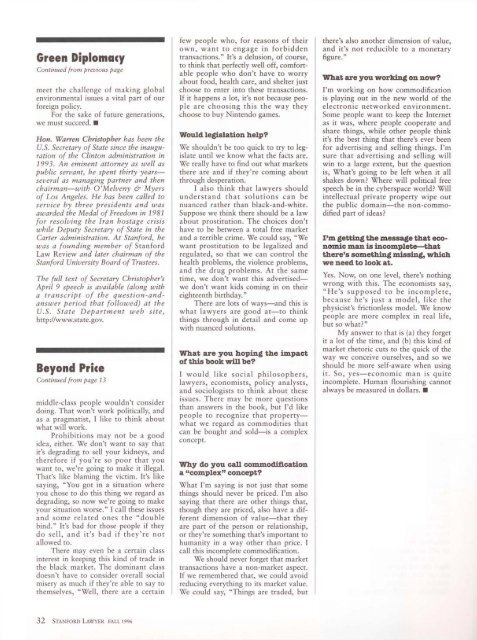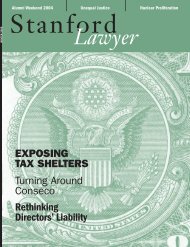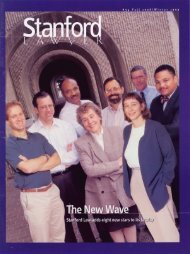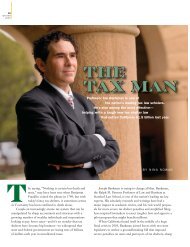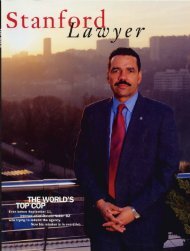Fall 1996 – Issue 50 - Stanford Lawyer - Stanford University
Fall 1996 – Issue 50 - Stanford Lawyer - Stanford University
Fall 1996 – Issue 50 - Stanford Lawyer - Stanford University
Create successful ePaper yourself
Turn your PDF publications into a flip-book with our unique Google optimized e-Paper software.
Green Diplomacy<br />
Continued from previous page<br />
meet the challenge of making global<br />
environmental issues a vital part of our<br />
foreign policy.<br />
For the sake of future generations,<br />
we must succeed.•<br />
Han. Warren Christopher has been the<br />
U.S. Secretary ofState since the inauguration<br />
of the Clinton administration in<br />
1993. An eminent attorney as well as<br />
public servant, he spent thirty yearsseveral<br />
as managing partner and then<br />
chairman-with O'Melveny & Myers<br />
of Los Angeles. He has been called to<br />
service by three presidents and was<br />
awarded the Medal ofFreedom in 1981<br />
for resolving the Iran hostage crisis<br />
while Deputy Secretary of State in the<br />
Carter administration. At <strong>Stanford</strong>, he<br />
was a founding member of <strong>Stanford</strong><br />
Law Review and later chairman of the<br />
<strong>Stanford</strong> <strong>University</strong> Board ofTrustees.<br />
The full text of Secretary Christopher's<br />
April 9 speech is available (along with<br />
a transcript of the question-andanswer<br />
period that followed) at the<br />
U.S. State Department web site,<br />
http://www.state.gov.<br />
Beyond Price<br />
Continued from page 13<br />
middle-class people wouldn't consider<br />
doing. That won't work politically, and<br />
as a pragmatist, I like to think about<br />
what will work.<br />
Prohibitions may not be a good<br />
idea, either. We don't want to say that<br />
it's degrading to sell your kidneys, and<br />
therefore if you're so poor that you<br />
want to, we're going to make it illegal.<br />
That's like blaming the victim. It's like<br />
saying, "You got in a situation where<br />
you chose to do this thing we regard as<br />
degrading, so now we're going to make<br />
your situation worse." I call these issues<br />
and some related ones the "double<br />
bind." It's bad for those people if they<br />
do sell, and it's bad if they're not<br />
allowed to.<br />
There may even be a certain class<br />
interest in keeping this kind of trade in<br />
the black market. The dominant class<br />
doesn't have to consider overall social<br />
misery as much if they're able to say to<br />
themselves, "Well, there are a certain<br />
few people who, for reasons of their<br />
own, want to engage in forbidden<br />
transactions." It's a delusion, of course,<br />
to think that perfectly well off, comfortable<br />
people who don't have to worry<br />
about food, health care, and shelter just<br />
choose to enter into these transactions.<br />
If it happens a lot, it's not because people<br />
are choosing this the way they<br />
choose to buy Nintendo games.<br />
Would legislation help?<br />
We shouldn't be too quick to try to legislate<br />
until we know what the facts are.<br />
We really have to find out what markets<br />
there are and if they're coming about<br />
through desperation.<br />
I also think that lawyers should<br />
understand that solutions can be<br />
nuanced rather than black-and-white.<br />
Suppose we think there should be a law<br />
about prostitution. The choices don't<br />
have to be between a total free market<br />
and a terrible crime. We could say, "We<br />
want prostitution to be legalized and<br />
regulated, so that we can control the<br />
health problems, the violence problems,<br />
and the drug problems. At the same<br />
time, we don't want this advertisedwe<br />
don't want kids coming in on their<br />
eighteenth birthday."<br />
There are lots of ways-and this is<br />
what lawyers are good at-to think<br />
things through in detail and come up<br />
with nuanced solutions.<br />
What are you hoping the impact<br />
of this book will be?<br />
I would like social philosophers,<br />
lawyers, economists, policy analysts,<br />
and sociologists to think about these<br />
issues. There may be more questions<br />
than answers in the book, but I'd like<br />
people to recognize that propertywhat<br />
we regard as commodities that<br />
can be bought and sold-is a complex<br />
concept.<br />
Why do you call commodiflcation<br />
a "complex" concept?<br />
What I'm saying is not just that some<br />
things should never be priced. I'm also<br />
saying that there are other things that,<br />
though they are priced, also have a different<br />
dimension of value-that they<br />
are part of the person or relationship,<br />
or they're something that's important to<br />
humanity in a way other than price. I<br />
call this incomplete commodification.<br />
We should never forget that market<br />
transactions have a non-market aspect.<br />
If we remembered that, we could avoid<br />
reducing everything to its market value.<br />
We could say, "Things are traded, but<br />
there's also another dimension of value,<br />
and it's not reducible to a monetary<br />
figure."<br />
What areyou working on now?<br />
I'm working on how commodification<br />
is playing out in the new world of the<br />
electronic networked environment.<br />
Some people want to keep the Internet<br />
as it was, where people cooperate and<br />
share things, while other people think<br />
it's the best thing that there's ever been<br />
for advertising and selling things. I'm<br />
sure that advertising and selling will<br />
win to a large extent, but the question<br />
is, What's going to be left when it all<br />
shakes down? Where will political free<br />
speech be in the cyberspace world? Will<br />
intellectual private property wipe out<br />
the public domain-the non-commodified<br />
part of ideas?<br />
I'm gettingthe message that economic<br />
man is incomplete-that<br />
there's something missing, which<br />
we needto look at.<br />
Yes. Now, on one level, there's nothing<br />
wrong with this. The economists say,<br />
"He's supposed to be incomplete,<br />
because he's just a model, like the<br />
physicist's frictionless model. We know<br />
people are more complex in real life,<br />
but so what?"<br />
My answer to that is (a) they forget<br />
it a lot of the time, and (b) this kind of<br />
market rhetoric cuts to the quick of the<br />
way we conceive ourselves, and so we<br />
should be more self-aware when using<br />
it. So, yes-economic man is quite<br />
incomplete. Human flourishing cannot<br />
always be measured in dollars.•<br />
32 STANFORD LAWYER FALL <strong>1996</strong>


